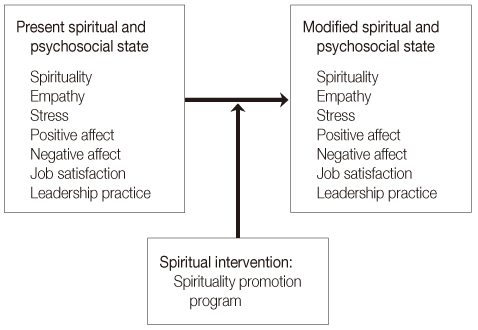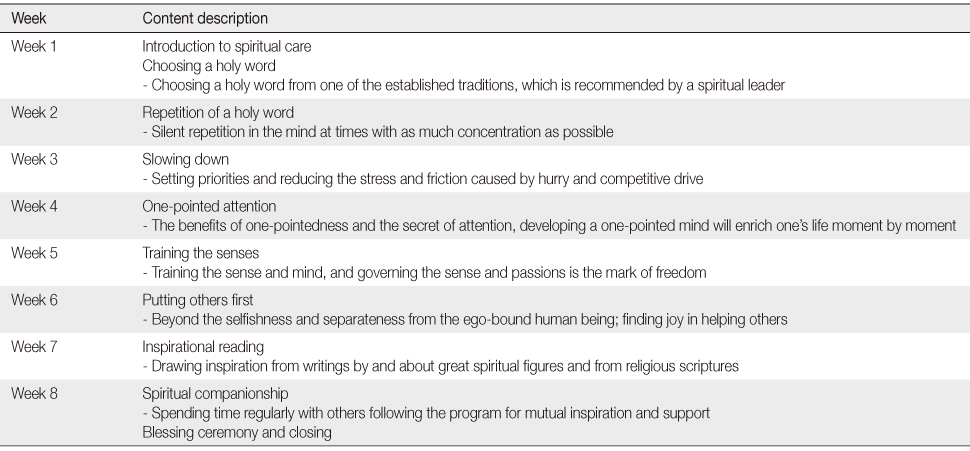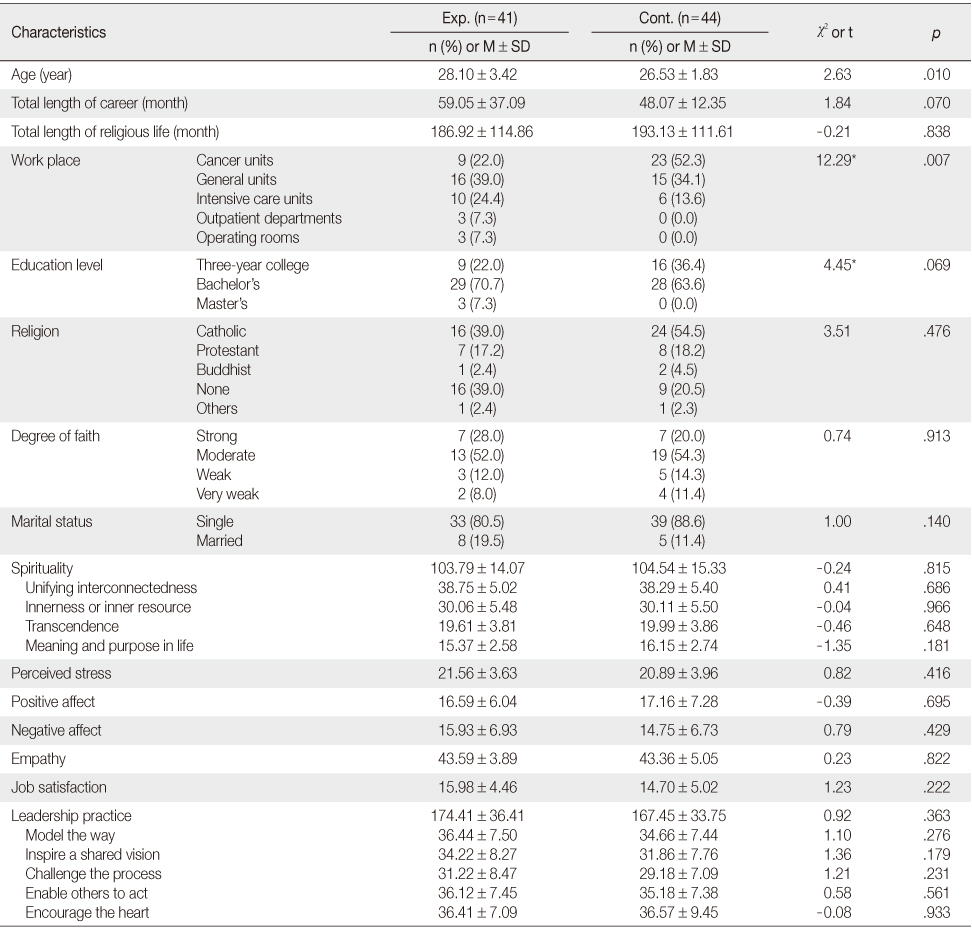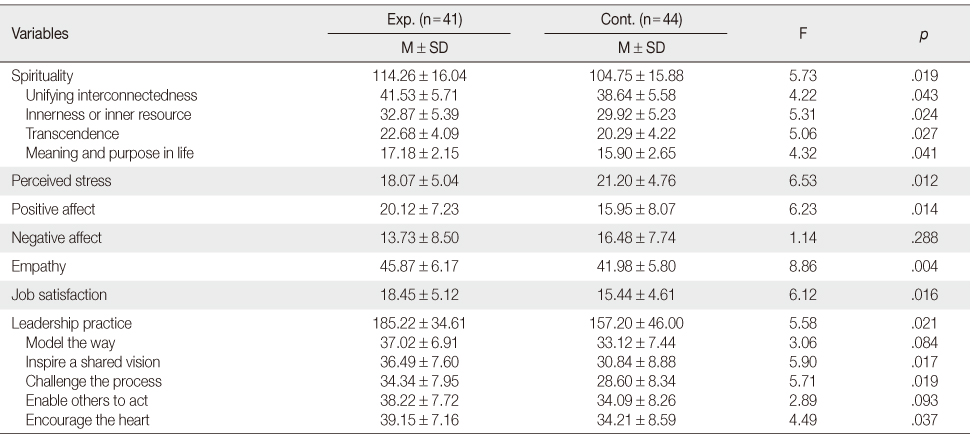Articles
- Page Path
- HOME > J Korean Acad Nurs > Volume 44(6); 2014 > Article
-
Original Article
- Spiritual and Psychosocial Effects of the Spirituality Promotion Program on Clinical Nurses
- Imsun Seo, Jinsun Yong, Junyang Park, Juhu Kim
-
Journal of Korean Academy of Nursing 2014;44(6):726-734.
DOI: https://doi.org/10.4040/jkan.2014.44.6.726
Published online: December 31, 2014
1College of Nursing, The Research Institute for Hospice & Palliative Care, The Catholic University, Seoul, Korea.
2Faculty of Theology, The Catholic University, Seoul, Korea.
3Graduate School of Education, Ajou University, Suwon, Korea.
- Address reprint requests to: Yong, Jinsun. College of Nursing, The Catholic University, 222 Banpo-daero, Seocho-gu, Seoul 137-701, Korea. Phone: +82-2-2258-7412, Fax: +82-2-2258-7772, jyong@catholic.ac.kr
© 2014 Korean Society of Nursing Science
This is an Open Access article distributed under the terms of the Creative Commons Attribution NoDerivs License. (http://creativecommons.org/licenses/by-nd/4.0/) If the original work is properly cited and retained without any modification or reproduction, it can be used and re-distributed in any format and medium.
Abstract
-
Purpose
- The purpose of this study was to evaluate the effects of the Spirituality Promotion Program(SPP) for young nurses working in the stressful university hospital environment.
-
Methods
- The study included 41 nurses in the experimental group, nurses who had worked less than 5 years and completed 8 weeks of SPP between June and July in 2011. The control group, 44 nurses, also received the same program after the study was completed. For the study, a survey was conducted of all participants concerning spirituality, perceived stress, positive and negative affect, empathy, job satisfaction, and leadership practice.
-
Results
- No significant difference was found between the two groups on study variables. Perceived stress decreased significantly in the experimental group (p=.012). Spirituality (p=.019), positive affect (p=.014), empathy (p=.004), job satisfaction (p=.016), and leadership practice (p=.021) increased significantly in the experimental group.
-
Conclusion
- The results show that the Spirituality Promotion Program has positive effects on the spiritual and psychosocial aspect of young nurses. Continuation of this program for nurses is recommended in order to help them develop their selfcare ability and improve nursing competency.
The authors wish to acknowledge the financial support of the Catholic Medical Center Research Foundation in 2011.
- 1. The Korean Nurses Association. Analysing work-related stress and influence factors of nurses. Seoul: Author; 2011.
- 2. Lee B. Trend analysis of nurses' stress based on the last 10 years of international research. Korean J Occup Health Nurs. 2012;21(1):27–36.Article
- 3. Kim BH, Chung BY, Kim JK, Lee AY, Hwang SY, Cho JA, et al. Current situation and the forecast of the supply and demand of the nursing workforce in Korea. Korean J Adult Nurs. 2013;25(6):701–711.ArticlePDF
- 4. Drury V, Craigie M, Francis K, Aoun S, Hegney DG. Compassion satisfaction, compassion fatigue, anxiety, depression and stress in registered nurses in Australia: Phase 2 results. J Nurs Manag. 2014;22(4):519–531.ArticlePubMedPDF
- 5. Oman D, Hedberg J, Thoresen CE. Passage meditation reduces perceived stress in health professionals: A randomized, controlled trial. J Consult Clin Psychol. 2006;74(4):714–719. http://dx.doi.org/10.1037/0022-006x.74.4.714ArticlePubMed
- 6. Jung YH, Kang DH, Jang JH, Park HY, Byun MS, Kwon SJ, et al. The effects of mind-body training on stress reduction, positive affect, and plasma catecholamines. Neurosci Lett. 2010;479(2):138–142. http://dx.doi.org/10.1016/j.neulet.2010.05.048ArticlePubMed
- 7. Van Vliet M, Jong MC, Jong M. Effects of a mind-body medicine skills program on perceived stress, empathy and self-reflection among medicine and nursing students: A quantitative study. J Altern Complement Med. 2014;20(5):A99. http://dx.doi.org/10.1089/acm.2014.5262.abstractArticle
- 8. Puchalski CM, Vitillo R, Hull SK, Reller N. Improving the spiritual dimension of whole person care: Reaching national and international consensus. J Palliat Med. 2014;17(6):642–656. http://dx.doi.org/10.1089/jpm.2014.9427ArticlePubMedPMC
- 9. Dossey BM. Florence nightingale: Mystic, visionary, healer. Philadelphia, PA: Lippincott Williams & Wilkins; 1999.
- 10. Baldacchino DR. Nursing competencies for spiritual care. J Clin Nurs. 2006;15(7):885–896. http://dx.doi.org/10.1111/j.1365-2702.2006.01643.xArticlePubMed
- 11. Yong J, Kim J, Park J, Seo I, Swinton J. Effects of a spirituality training program on the spiritual and psychosocial well-being of hospital middle manager nurses in Korea. J Contin Educ Nurs. 2011;42(6):280–288. http://dx.doi.org/10.3928/00220124-20101201-04ArticlePubMed
- 12. Brunero S, Lamont S, Coates M. A review of empathy education in nursing. Nurs Inq. 2010;17(1):65–74. http://dx.doi.org/10.1111/j.1440-1800.2009.00482.xArticlePubMed
- 13. Clark L, Leedy S, McDonald L, Muller B, Lamb C, Mendez T, et al. Spirituality and job satisfaction among hospice interdisciplinary team members. J Palliat Med. 2007;10(6):1321–1328. http://dx.doi.org/10.1089/jpm.2007.0035ArticlePubMed
- 14. Strack JG, Fottler MD, Kilpatrick AO. The relationship of health-care managers' spirituality to their self-perceived leadership practices. Health Serv Manage Res. 2008;21(4):236–247. http://dx.doi.org/10.1258/hsmr.2008.008004ArticlePubMedPDF
- 15. Kouzes JM, Posner BZ. The leadership challenge. 4th ed. San Francisco, CA: Jossey-Bass; 2008.
- 16. Sulmasy DP. The rebirth of the clinic: An introduction to spirituality in health care. Washington, DC: Georgetown University Press; 2006.
- 17. Easwaran E. Passage meditation: Bringing the deep wisdom of the heart into daily life. 3rd ed. Tomales, CA: Nilgiri Press; 2008.
- 18. Howden JW. Development and psychometric characteristics of the spirituality assessment scale [dissertation]. Denton, TX, Texas Woman's Univeristy. 1992.
- 19. Oh PJ, Chun HS, So WS. Spiritual assessment scale: Psychometric evaluation of the Korean version. J Korean Oncol Nurs. 2001;1(2):168–179.
- 20. Cohen S, Williamson G. Perceived stress in a probability sample of the United States. In: Spacapan S, Oskamp S, editors. The social psychology of health: Claremont symposium on applied social psychology. Newbury Park, CA: Sage; 1988. p. 31–67.
- 21. Lee YH. The relationships between perceived stress, spiritual well-being and self-care behavior in patient with type 2 diabetes [master's thesis]. Seoul, Yonsei University. 2007.
- 22. Lee EH. Review of the psychometric evidence of the perceived stress scale. Asian Nurs Res. 2012;6(4):121–127. http://dx.doi.org/10.1016/j.anr.2012.08.004Article
- 23. Watson D, Clark LA, Tellegen A. Development and validation of brief measures of positive and negative affect: The PANAS scales. J Pers Soc Psychol. 1988;54(6):1063–1070.ArticlePubMed
- 24. Lee HH, Kim EJ, Lee MK. A validation study of Korea positive and negative affect schedule: The PANAS scales. Korean J Clin Psychol. 2003;22(4):935–946.
- 25. Spreng RN, McKinnon MC, Mar RA, Levine B. The Toronto empathy questionnaire: Scale development and initial validation of a factor-analytic solution to multiple empathy measures. J Pers Assess. 2009;91(1):62–71. http://dx.doi.org/10.1080/00223890802484381ArticlePubMedPMC
- 26. Chamiec-Case RR. Developing a tool to measure social workers' perceptions regarding the extent to which they integrate their spirituality in the workplace [dissertation]. Bronx, NY, Fordham University. 2006.
- 27. Crawford JR, Henry JD. The positive and negative affect schedule (PANAS): Construct validity, measurement properties and normative data in a large non-clinical sample. Br J Clin Psychol. 2004;43(3):245–265. http://dx.doi.org/10.1348/0144665031752934ArticlePubMed
- 28. Mercer SW, Reynolds WJ. Empathy and quality of care. Br J Gen Pract. 2002;52:Suppl. S9–S12.PubMedPMC
- 29. La Monica EL, Wolf RM, Madea AR, Oberst MT. Empathy and nursing care outcomes. Sch Inq Nurs Pract. 1987;1(3):197–213.ArticlePubMed
- 30. Wagner JI, Gregory DM. Spirit at work (SAW): Fostering a healthy RN workplace. West J Nurs Res. 2014;Forthcoming. http://dx.doi.org/10.1177/0193945914521304
REFERENCES
Figure & Data
REFERENCES
Citations

- The mediating role of empathy and moral sensitivity in nurses’ spiritual health and spiritual caregiving competence: a cross-sectional study
Jin Jiang, JinWei Du, YingWei Sun, PeiXiao Zhang, YanYu Gong, Yue Sun, Hong Qu
BMC Nursing.2025;[Epub] CrossRef - Influences of Organizational Culture, Nursing Workplace Spirituality, and Nurses’ Perceived Health Status on Quality of Nursing Work Life according to Nursing Clinical Ladder
Hyun Sook Lee, Ju Hyun Jin, Ju Ri Lee, Hye Jin Kim, Yeon Jae Jung
Journal of Korean Academy of Nursing Administration.2024; 30(1): 31. CrossRef - Spiritual well-being levels of formal and informal cancer caregivers in Turkish society and influencing factors: A comparative study
Ayşegül ÇELİK, D Çınar
Progress in Health Sciences.2024; 13(2): 7. CrossRef - Individual-level interventions for reducing occupational stress in healthcare workers
Sietske J Tamminga, Lima M Emal, Julitta S Boschman, Alice Levasseur, Anilkrishna Thota, Jani H Ruotsalainen, Roosmarijn MC Schelvis, Karen Nieuwenhuijsen, Henk F van der Molen
Cochrane Database of Systematic Reviews.2023;[Epub] CrossRef - Effectiveness of International Hospice and Palliative Care Training for Health Care Professionals in Countries of the Western Pacific Region
Hyunjoo Na, Gyungjoo Lee, Hye-lyung Hwang, Sujeong Kim, Jinsun Yong
Journal of Hospice & Palliative Nursing.2022; 24(5): E197. CrossRef - The Effect of Nurse Support Programs on Job Satisfaction and Organizational Behaviors among Hospital Nurses: A Meta-Analysis
Se Young Kim, Mi-Kyoung Cho
International Journal of Environmental Research and Public Health.2022; 19(24): 17061. CrossRef - Influence of Spirituality and Job Satisfaction on the Compassion Competence of Hospice Nurses
Su-Jeong Lee, Hyun-E Yeom
The Korean Journal of Hospice and Palliative Care.2022; 25(4): 169. CrossRef - Effects of a Spirituality Promotion Program on Spirituality, Empathy and Stress in Nursing Students
Seok-Jung Kang, Jinsun Yong
Journal of Korean Academy of Fundamentals of Nursing.2019; 26(4): 240. CrossRef - Experience of Spiritual Conflict in Hospice Nurses: A Phenomenological Study
Byoung Sook Lee, Su Young Kwak
Journal of Korean Academy of Nursing.2017; 47(1): 98. CrossRef - Influence of Self-esteem, Communication and Existential Well-being on Spiritual Care Competence in Nurses
Mira Sim, Jin Kim, Sookyung Choi
Journal of Korean Academy of Fundamentals of Nursing.2017; 24(4): 286. CrossRef - Effect of The Spiritual Care Module Education Program for Nurses
Jin Ok Jeong, Hyun Sook Jo, Sang hee Kim
The Journal of Korean Academic Society of Nursing Education.2016; 22(1): 51. CrossRef - The Effect of Suffering Experience, Empathy Ability, Caring Behaviors on Terminal Care Performance of Clinical Nurses
Kae Hwa Jo, Ae Ran Park, Jin Ju Lee, Su Jung Choi
The Korean Journal of Hospice and Palliative Care.2015; 18(4): 276. CrossRef

Figure 1
Contents of the Spirituality Promotion Program
Homogeneity Test for General Characteristics & Study Variables (N=85)
*Fisher's exact test; Exp.=Experimental group; Cont.=Control group.
Effects of the Spirituality Promotion Program on Spirituality, Perceived Stress, Positive Affect, Negative Affect, Empathy, Job Satisfaction, and Leadership Practice (N=85)
Exp.=Experimental group; Cont.=Control group.
*Fisher's exact test; Exp.=Experimental group; Cont.=Control group.
Exp.=Experimental group; Cont.=Control group.
 KSNS
KSNS
 E-SUBMISSION
E-SUBMISSION




 Cite
Cite

